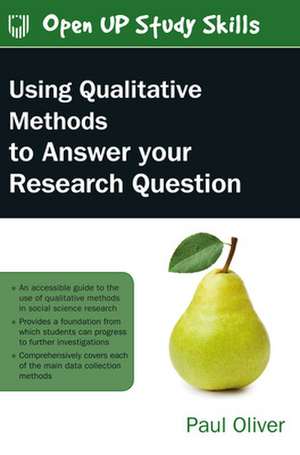Using Qualitative Methods to Answer Your Research Question
Autor Paul Oliveren Limba Engleză Paperback – 4 aug 2021
The book provides detailed guidance on:
•Types of research questions best suited to investigation using qualitative approaches
•Selecting a research question and applying the appropriate methodology
•Relating the aims of a research question to the nature of the methodology chosen
•The main approaches to the collection and analysis of qualitative data
•Using qualitative methods in your research
•The different levels of detail required of undergraduate and postgraduate writing
This book is ideal for all students carrying out a research dissertation or planning the research for their thesis.
“Oliver’s book is an interesting and engaging personal introduction to qualitative research and would be a useful text for first time researchers on undergraduate courses or as a pre-course suggested reading for those starting postgraduate research programmes.”
Alaster Scott Douglas, Reader in Education and Professional Practice, University of Roehampton, London, UK
“Accessible, clear and with the needs of the researcher in mind, this book ensures the fundamentals of qualitative research are explored through enthusiasm for the subject matter, an appreciation of the conceptual and philosophical underpinnings, as well as the practicalities of planning and conducting research.”
Dr. Yunis Alam, Senior Lecturer in Sociology, University of Bradford, UK
Paul Oliver is a former Principal Lecturer in the School of Education and Professional Development, at the University of Huddersfield, UK. He was course leader for the Doctor of Education programme, and also taught widely on the master's programme in education.
Preț: 237.50 lei
Nou
Puncte Express: 356
Preț estimativ în valută:
45.45€ • 46.88$ • 37.92£
45.45€ • 46.88$ • 37.92£
Carte tipărită la comandă
Livrare economică 27 martie-10 aprilie
Preluare comenzi: 021 569.72.76
Specificații
ISBN-13: 9780335248957
ISBN-10: 0335248950
Pagini: 296
Dimensiuni: 154 x 227 x 12 mm
Greutate: 0.31 kg
Editura: McGraw Hill Education
Colecția Open University Press
Locul publicării:United Kingdom
ISBN-10: 0335248950
Pagini: 296
Dimensiuni: 154 x 227 x 12 mm
Greutate: 0.31 kg
Editura: McGraw Hill Education
Colecția Open University Press
Locul publicării:United Kingdom
Cuprins
Section A The main features of qualitative methods.
Chapter 1 Distinguishing between qualitative and quantitative methods.
Chapter 2 Interpretive research and the scientific paradigm.
Section B The reasons for using qualitative methods.
Chapter 3 Research questions and the interpretive paradigm.
Chapter 4 Sampling strategies in qualitative research.
Chapter 5 Research ethics.
Section C The methods of collecting qualitative data.
Chapter 6 Research questions and plans for methodology.
Chapter 7 Phenomenological research.
Chapter 8 Interview research
Chapter 9 Ethnographic research.
Chapter 10 Life history, oral history, and autobiographical research.
Chapter 11 Symbolic interactionism and participant observation.
Chapter 12 Case study research.
Chapter 13 Action research.
Chapter 14 Feminist research.
Section D The analysis and presentation of qualitative data.
Chapter 15 Types of data to be analysed.
Chapter 16 Grounded Theory
Chapter 1 Distinguishing between qualitative and quantitative methods.
Chapter 2 Interpretive research and the scientific paradigm.
Section B The reasons for using qualitative methods.
Chapter 3 Research questions and the interpretive paradigm.
Chapter 4 Sampling strategies in qualitative research.
Chapter 5 Research ethics.
Section C The methods of collecting qualitative data.
Chapter 6 Research questions and plans for methodology.
Chapter 7 Phenomenological research.
Chapter 8 Interview research
Chapter 9 Ethnographic research.
Chapter 10 Life history, oral history, and autobiographical research.
Chapter 11 Symbolic interactionism and participant observation.
Chapter 12 Case study research.
Chapter 13 Action research.
Chapter 14 Feminist research.
Section D The analysis and presentation of qualitative data.
Chapter 15 Types of data to be analysed.
Chapter 16 Grounded Theory
